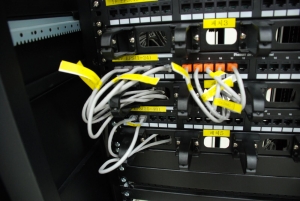

THE EFF is happy with the outcome of a trial that Dietrich Schmitz covered on Friday. "Luckily for the defendant," he said, "the judge ruled early on before the case got under way and was saved a substantial sum in litigation fees for fighting a frivolous lawsuit." But the main point here, patents got thrown out for being reducible to math, just like all software patents. This is major.
Today was a big day in patent law, which is important to anyone who thinks they might one day have an original idea for a product, and wants to protect it. In particular, if that idea involves an algorithm or software.
First, a federal judge in the Eastern District of Texas threw out a claim against cloud storage company Rackspace, stemming from a 2012 complaint filed by Uniloc USA. The case, according to a TechCrunch report, asserted that the “processing of floating point numbers by the Linux operating system was a patent violation.” In other words, a processing method, or counting method, might be the exclusive property of Uniloc.
Several times in recent years, opponents of software patents have looked hopefully to Congress and the Supreme Court for a solution to the expensive problem of software patents, and several times we've been disappointed. The narrow Bilski v. Kappos ruling invalidated one business method patent but left the question of software patents to one side, and even arguably weakened a rule—the "machine-or-transformation" test—intended to limit the scope of patentability. The reforms of the America Invents Act were half-hearted; they provided additional opportunities to challenge patents at the USPTO, but did not fundamentally affect the rules for patenting software.
Despite these missed opportunities, there are signs of slower but consistent reform in the courts, and yesterday's ruling in the Eastern District of Texas in Uniloc v. Rackspace is one of them. The Uniloc ruling is about as good as it gets for a defendant in a software patent case: the judge dismissed the case at an early stage on the grounds that the claim at issue described an unpatentable mathematical formula.
A patent troll that accused Rackspace of violating a patent merely by selling Linux-based servers has seen its case thrown out. A judge ruled the patent claim invalid because it describes a relatively simple math operation.
The company in question is Uniloc, which has a long history of suing tech vendors. In 2009, a US District Court judge overturned a $388 million verdict Uniloc had won against Microsoft. That litigation was finally settled late last year for an undisclosed sum. Uniloc continues litigating however, with at least a dozen lawsuits filed just last week.
Uniloc sued Rackspace in June 2012 in US District Court in Eastern Texas (PDF), claiming Rackspace violated its patent "by or through making, using, offering for sale, selling and/or importing servers running Linux Kernel (version 2.6 or higher), which is used to process floating point operations carried out on Rackspace’s servers including those servers used in conjunction with Rackspace’s hosting solutions/products."
Plaintiff Uniloc USA, Inc. is a frequent litigator, having brought patent lawsuits against many high-tech companies including Adobe, Microsoft, Sony and Symantec. Rackspace provides its customers with managed servers running the Linux operating system. Red Hat, which supplies Linux to Rackspace, provided Rackspace's defense as part of Red Hat's commitment to standing behind customers through Red Hat's Open Source Assurance program.
Red Hat, Inc. (NYSE: RHT) and Rackspace Hosting, Inc. (NYSE: RAX) announced that they have won a federal court decision granting early dismissal of all claims in a lawsuit brought by the patent assertion entity Uniloc USA, Inc.
Plaintiff Uniloc USA, Inc. is a frequent litigator, having brought patent lawsuits against many high-tech companies including Adobe, Microsoft, Sony and Symantec. Rackspace provides its customers with managed servers running the Linux operating system. Red Hat, which supplies Linux to Rackspace, provided Rackspace’s defense as part of Red Hat’s commitment to standing behind customers through Red Hat’s Open Source Assurance program.
Red Hat and Rackspace have won the court battle with patent troll Uniloc USA, Inc. The company alleged in its complaint that the processing of floating point numbers by the Linux operating system violated U.S. Patent 5,892,697. A federal court decision had granted an early dismissal of all claims in a lawsuit brought by Uniloc USA, Inc.